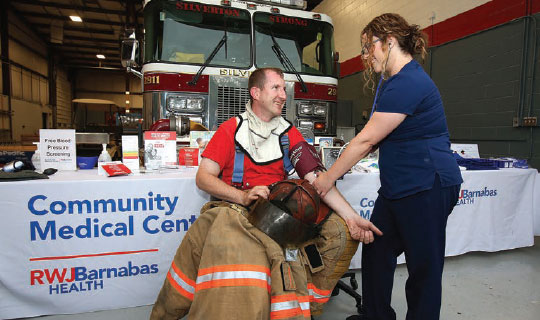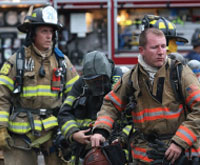A new focus on health and well-being is benefiting the Toms River Fire Department
 Firefighters put their lives on the line every time they rush into a burning building. What may not be as obvious are the health risks associated with their bravery. for instance, firefighters are at risk of suffering a heart attack or sudden cardiac death while on the job. Over the past decade or so, nearly half of the nation’s line-of-duty deaths were attributed to a heart attack, according to the United States fire Administration. In addition, research shows that firefighters are at greater risk for developing cancer, including esophageal, colon, kidney, bladder, lung, oral and pharynx (throat). The evidence is so strong that 34 states have enacted legislation that recognizes certain cancers as occupational diseases among firefighters. What’s more, firefighters are at risk for other problems, such as obesity. Rates of overweight and obesity among career and volunteer firefighters across the nation range from 73 to 88 percent, according to a National Volunteer fire Council Report.
Firefighters put their lives on the line every time they rush into a burning building. What may not be as obvious are the health risks associated with their bravery. for instance, firefighters are at risk of suffering a heart attack or sudden cardiac death while on the job. Over the past decade or so, nearly half of the nation’s line-of-duty deaths were attributed to a heart attack, according to the United States fire Administration. In addition, research shows that firefighters are at greater risk for developing cancer, including esophageal, colon, kidney, bladder, lung, oral and pharynx (throat). The evidence is so strong that 34 states have enacted legislation that recognizes certain cancers as occupational diseases among firefighters. What’s more, firefighters are at risk for other problems, such as obesity. Rates of overweight and obesity among career and volunteer firefighters across the nation range from 73 to 88 percent, according to a National Volunteer fire Council Report.
Screening For Medical Problems
The Toms River Fire Department (TRFD) is the largest organization of its kind in Ocean County. It’s composed of six fire companies and is staffed by 350 volunteers. To improve the health of these dedicated community members, Community Medical Center (CMC) recently began holding health fairs at the Toms River Fire Training Center. At the fairs, CMC physicians and health care professionals discuss the hospital’s bariatric and smoking cessation programs. They also screen firefighters for high blood pressure and blood glucose levels (a marker of diabetes). When firefighters participate in “live burns,” or training drills, CMC staff members check firefighters’ blood pressure before and afterward. “At least two of our firefighters were diagnosed with high blood pressure through the CMC screenings,” says Richard Tutela, a commissioner with the TRFD. “They went to their primary care doctors for treatment.”
Diversity Training
Last year, for the first time, CMC held diversity and inclusion training sessions for the TRFD. The volunteer service is more diverse than ever, and the TRFD strives to create an inclusive organizational culture. Over the course of three sessions, CMC staff members, including the Director of Diversity and Inclusion, educated more than 100 fire department leaders about the importance of recognizing their own personal perceptions and biases. They learned how to communicate openly and model behaviors that are accepting of differences.
 The TRFD and CMC share a commitment to keep Ocean County residents safe and healthy. “We are proud to partner with the Toms River Fire Department to ensure the well-being of our community’s volunteer firefighters,” says Patrick Ahearn, Chief Executive Officer of CMC. “We need to take care of them, just as they take care of us. It’s our mission to improve the health and wellness of everyone in the community we serve.”
The TRFD and CMC share a commitment to keep Ocean County residents safe and healthy. “We are proud to partner with the Toms River Fire Department to ensure the well-being of our community’s volunteer firefighters,” says Patrick Ahearn, Chief Executive Officer of CMC. “We need to take care of them, just as they take care of us. It’s our mission to improve the health and wellness of everyone in the community we serve.”
The Link Between Firefighting and Cancer
In 2018, the Centers for Disease Control and Prevention created the National Firefighter Registry to better understand the link between firefighting and cancer. Now, researchers are taking a closer look at the health risks among firefighters in New Jersey. Rutgers Cancer Institute of New Jersey has initiated a study of New Jersey firefighters, including those from Toms River, to assess their cancer risk. “The Toms River Fire Department was very proactive,” says Michael Steinberg, MD, MPH, FACP, Professor and Chief, Division of General Internal Medicine, and Vice Chair for Research in the Department of Medicine at Rutgers Robert Wood Johnson Medical School and Director of the Rutgers Tobacco Dependence Program. “They approached us to find out if we could look at cancer risks among volunteer firefighters.” Brian S. Kubiel, Chief Administrator for the Toms River Board of Fire Commissioners District #1, says cancer has affected the service. “There are several volunteer firefighters who are currently being treated for cancer,” he says. “Many have been treated successfully and continue to serve our township as volunteer firefighters.”
In the two-year study, which will be funded by the RWJBarnabas Health Foundation and Rutgers Cancer Institute, researchers will assess cancer risk among New Jersey firefighters; create a New Jersey Firefighter Cancer Registry, which can be integrated into the national database; and study cancer risk among Toms River firefighters. “The Toms River firefighters will have biomonitors with them when they’re at a fire so we can measure their exposure to toxins, and we will take samples from their equipment when they’re done,” says Dr. Steinberg. “We will also perform environmental monitoring in the firehouses to check for toxins. We will look at the ventilation in the buildings, for instance, as well as how the equipment is cleaned after a fire.”
The researchers will also investigate lifestyle risk factors, such as diet, alcohol use, smoking, participation in cancer screenings and access to medical care. The firefighters will submit blood and urine samples for testing. “We are looking holistically at the firefighters’ cancer risk,” says Dr. Steinberg. “Not only are we looking at what they’re breathing in when they’re on the job, but we’re also looking at their tobacco and alcohol use, as well as their cancer screening rate. Our goal is to develop an effective intervention for preventing cancer.”
For information about programs offered by Community Medical Center’s Community Outreach Department, call 732.557.3210.